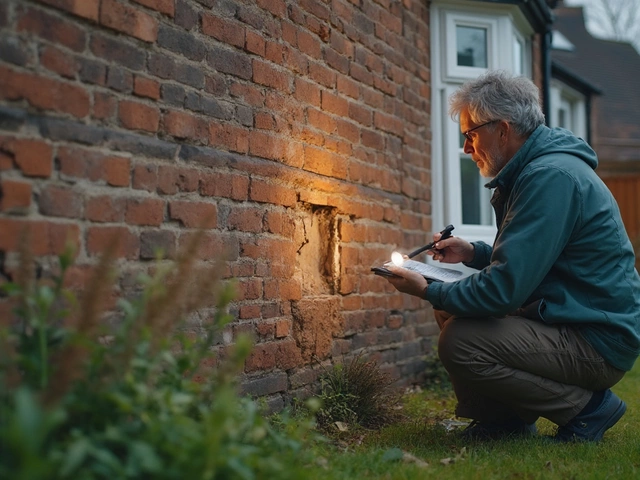If you think swinging a hammer on a jobsite leads to just average pay, think again. Some trades in construction pull in salaries that compete with desk jobs—no college degree required. Elevator installers and repair techs are at the top, with union electricians, plumbers, and boilermakers not far behind. These aren’t just side gigs—they’re long-term, well-paid careers.
Ever see those guys working on high-rise elevators or fixing complex wiring in big hospitals? They’re not just good with their hands, they’ve got specific skills that are seriously in demand. Take elevator mechanics: their 2024 average salary in the US hit around $100,000, and some with experience pull even more with overtime. Electricians who master controls and automation bring home almost as much, especially if they work in major cities or with a specialty union. The common theme? High risk, specialized knowledge, and the kind of work nobody wants to mess up.
- Trade Rankings: Who Really Earns the Most?
- Why Do Certain Trades Pay So Well?
- What Skills and Training Get You in the Top Bracket?
- Job Demand and Security: Which Trades Are Safe Bets?
- Real-World Examples: Success Stories from the Field
- How to Maximize Your Earnings in Construction
Trade Rankings: Who Really Earns the Most?
If you’re chasing after the top dollar in construction, you don’t want guesses—you want numbers. There’s a clear pecking order when it comes to who gets the biggest paychecks for swinging tools or running machines. Here’s a breakdown of the highest paid trades, using recent US Labor Department data from 2024. These numbers are for annual median earnings, but high-demand locations or big commercial gigs can push them even higher.
| Trade | Median Annual Pay (2024) |
|---|---|
| Elevator Installers & Repairers | $100,500 |
| Boilermakers | $70,600 |
| Electricians | $66,900 |
| Plumbers, Pipefitters & Steamfitters | $65,400 |
| Construction Managers* | $101,300 |
| Ironworkers | $62,100 |
*Okay, so construction managers top even the elevator pros. But most managers worked years “on the tools” before landing their spot. For most folks wanting a high-paid trade, elevator tech is the way to go if you want hands-on work with a fat paycheck.
Why the gap? These top trades have major responsibilities—heavy machinery, public safety, and critical building systems. Some, like elevator installers, also have long apprenticeships and tough union entrance exams, which basically filter for serious pros only.
- Special certifications or state licenses = more money.
- Union membership can bump up pay and benefits.
- Overtime, night shifts, or remote projects often mean bigger checks—especially for elevator techs and electricians.
So, if you’re sick of low pay or want to switch trades, this list shows exactly where to aim. You won’t find better pay in hands-on construction work anywhere else.
Why Do Certain Trades Pay So Well?
Ever wondered why certain folks in construction walk away with much bigger paychecks? It boils down to a mix of risk, skill, and just pure demand. Some trades deal with stuff where mistakes can cost big—either in time, money, or safety. Take elevator mechanics: they work with systems that, if they fail, can lead to huge safety issues. Not everyone can handle that kind of pressure, so they get paid more.
Another major thing is how few people are qualified for the gig. Elevator techs and controls electricians need years of training, apprenticeships, and sometimes state licensing, which means there aren’t a ton of people lining up for the job. Employers have to pay more to snag and keep the best talent. The same goes for welders working with rare materials or at crazy heights—these spots stay open longer, so wages get bumped up to attract the right pros.
Let’s lay out some 2024 data so it’s crystal clear where the money is going:
| Trade | Median Annual Salary | Requirements |
|---|---|---|
| Elevator Installer/Repairer | $100,720 | Apprenticeship, State License |
| Electrician (Master) | $78,000 | Apprenticeship, State License |
| Plumber/Pipefitter | $67,000 | Apprenticeship, Certification |
| Boilermaker | $70,100 | Apprenticeship |
Let’s not forget location and unions. Working on high-profile projects in big cities (think New York or San Francisco) or landing a gig with a strong union pushes those paychecks even higher. Unions mean better hourly rates, overtime protection, and great benefits. So, if you want to join the ranks of the highest paid trade in construction, look for roles that are tough to learn, risky to do, or where demand is through the roof.
What Skills and Training Get You in the Top Bracket?
If you want to land one of those top-paying construction jobs, just being strong or willing to work hard isn’t enough. You need real skills and the right training—stuff you can’t fake or just pick up by watching videos online. For example, elevator installers usually go through a four-year apprenticeship. Electricians do something similar, mixing classroom lessons and hands-on practice. Without these credentials, you’re not getting anywhere near the best paychecks.
Getting certified is a pretty big deal in construction. If you’re hoping to break into highest paid trade roles, you’ll likely need a union apprenticeship program or trade school background. Appliance installers, plumbers, and boilermakers all follow this model, too. A lot of these trades even require state licenses and passing tough exams—especially if you want to pull permits or run your own crew.
Tech skills are also showing up everywhere. Electricians and HVAC techs now have to deal with smart systems and automation controls. Being comfortable with basic coding or digital tools can actually set you apart. It’s not just about turning wrenches anymore.
| Trade | Typical Training Needed | Average Certification Time | Key Skills |
|---|---|---|---|
| Elevator Installer | Union Apprenticeship, State License | 4-5 years | Electrical, Mechanical, Safety Codes |
| Electrician | Apprenticeship, State License | 4 years | Circuitry, Troubleshooting, Code Compliance |
| Plumber | Trade School, Apprenticeship, License | 4-5 years | Pipefitting, System Design, Problem-Solving |
| Boilermaker | Apprenticeship, Certifications | 4-5 years | Welding, Blueprint Reading, Equipment Repair |
If you’re serious about moving up, keep an eye on continuing education. Codes change, tech evolves, and companies want folks who keep their skills fresh. Many trade unions offer upgrade classes and workshops—you just have to show up and put in the effort. That's what separates average workers from top earners.
- Look for local apprenticeship openings early—they’re competitive.
- Don’t skip the math basics. A lot of high-paying trade exams are math-heavy.
- Stay current on safety certs like OSHA 30. Some jobs won’t even let you on site without them.
- If automation or controls interest you, consider specialized courses. You’ll stand out fast.
This mix of training, credentials, and “wanting to level up” is how you get into those high-dollar slots in construction. It’s not rocket science, but it definitely takes commitment.

Job Demand and Security: Which Trades Are Safe Bets?
If you want long-term job security in construction, pay attention to trades where people just aren’t going away anytime soon. Elevator installers, electricians, and plumbers are rock-solid bets year after year. The reason? Buildings always need power, working elevators, and plumbing, no matter how fancy technology gets. Even when the economy slows, these folks stay busy because repairs and upgrades can’t wait.
So, which trades really stand out for demand? Here’s a look at the numbers from 2024, pulled from the U.S. Bureau of Labor Statistics:
| Trade | Job Growth (2024-2034 projected) | Median Salary (2024) |
|---|---|---|
| Elevator Installers/Repairers | 11% | $100,000 |
| Electricians | 6% | $65,000 |
| Plumbers, Pipefitters, Steamfitters | 4% | $61,000 |
| HVAC Technicians | 5% | $58,000 |
| Boilermakers | 1% | $70,000 |
See the pattern? The highest paid trade—elevator installers—also has one of the fastest projected growth rates, thanks to more tall buildings and aging equipment. Electricians and plumbers are close behind because every house and building needs what they do, and it’s not getting automated away.
- Highest paid trade skills require years of on-the-job training and certifications. That’s why they stay in demand.
- Large cities and areas with new construction offer more opportunities—think New York, Dallas, or LA.
- Older infrastructure boosts job security because someone has to keep things running as stuff breaks down.
If you’re looking for a safe bet in construction, go for trades tied to what every building has—power, water, elevators. These jobs offer not just solid pay but peace of mind knowing work won’t dry up when the economy dips.
Real-World Examples: Success Stories from the Field
When you hear about folks making big money in construction, it’s easy to think it’s just a myth. But you can actually see real people stacking serious paychecks, especially in the highest paid trade areas.
Take Mike Torres, for example—a licensed elevator technician in Los Angeles. He started as an apprentice right out of high school, got union training, and now averages over $120,000 a year with regular overtime. Mike’s been sent out to high-end hotels and hospitals where each job means handling major safety and technical issues. Most gigs aren’t flashy, but when you fix elevators nobody else can handle, you get a lot of calls—and the pay proves it.
Another solid story is Sandra Lynn, a master electrician based in Chicago. After ten years working up the ranks, she’s now running jobs on commercial buildings, bringing in close to $110,000 per year. She says her jump in pay started when she got certified in automation systems. More companies want tech-savvy electricians, and Sandra always gets the best assignments.
Union plumbers in cities like New York and Boston often see similar results. For instance, Jake Nguyen joined his local plumber’s union, worked a lot of nights on hospital projects, and last year grossed just under $95,000. The union benefits helped him buy his first home before turning 30. His secret? Learn the tough stuff, take calls nobody else wants, and don’t be afraid of overtime.
Plenty of these high earners point to a few real takeaways anyone can learn from:
- Start with a quality apprenticeship—it’s the fastest way in if you want solid skills and real pay upgrades.
- Specialize where it counts: mastering a niche, like elevators or automation, instantly sets you apart.
- Stay up to date with certifications and don’t shy away from extra shifts. The best gigs usually go to those who put in the work and keep learning.
If you’re wondering if those pay numbers are outliers, check the Bureau of Labor Statistics. The top 10% of elevator repairers, electricians, and plumbers do pull in these big salaries—and it’s usually the ones who work smart, seize overtime, and stay in demand.
How to Maximize Your Earnings in Construction
If you want to take home more every payday, you need more than muscle. Here’s the lowdown on making the big bucks in the highest paid trade roles out there.
- Get Licensed and Certified: States and cities pay more to tradespeople who hold valid licenses. Elevator installers, electricians, and plumbers often need both state licenses and certifications through groups like the National Electrical Contractors Association or the National Association of Elevator Contractors. This unlocks better jobs and bigger paychecks.
- Join a Union: Union trades typically pay more and offer benefits like healthcare and retirement. Nearly 80% of elevator repairers, for example, are in a union—and that’s a huge reason their pay averages six figures.
- Find a Niche: Specializing pays off. Take an ordinary electrician; if they branch into programmable logic controllers (PLC) or high-voltage work, their average wage jumps by 15-30%.
- Chase Overtime and Unusual Hours: Some trades rack up serious cash with overtime or working nights, weekends, or on-call shifts. It’s not for everyone, but if you’re willing, you could push your yearly income up by $15,000 to $25,000, especially in fields like elevator maintenance and electrical work.
- Move Where the Money Is: Big cities and boom towns pay way better. For instance, elevator installers in San Francisco can pull down over $120,000 a year, compared to the U.S. average of $100,000.
- Keep Learning: Stay on top of new codes, tech, and safety rules. That makes you valuable and puts you in the running for foreman or supervisor gigs, which push salaries even higher.
| Trade | Extra Certification | Union Member | Pay Bump (%) |
|---|---|---|---|
| Elevator Installer | QEI Inspector | Yes | +18% |
| Electrician | PLC, Solar | Yes | +12%-30% |
| Plumber | Backflow Cert. | Yes | +17% |
Bottom line: the pros making six figures in construction are mixing skills with strategy. They pick the right trade, go after qualifications that set them apart, and aren’t afraid to put in the hours where the premium money is. That’s how you turn a good paycheck into a great one.





